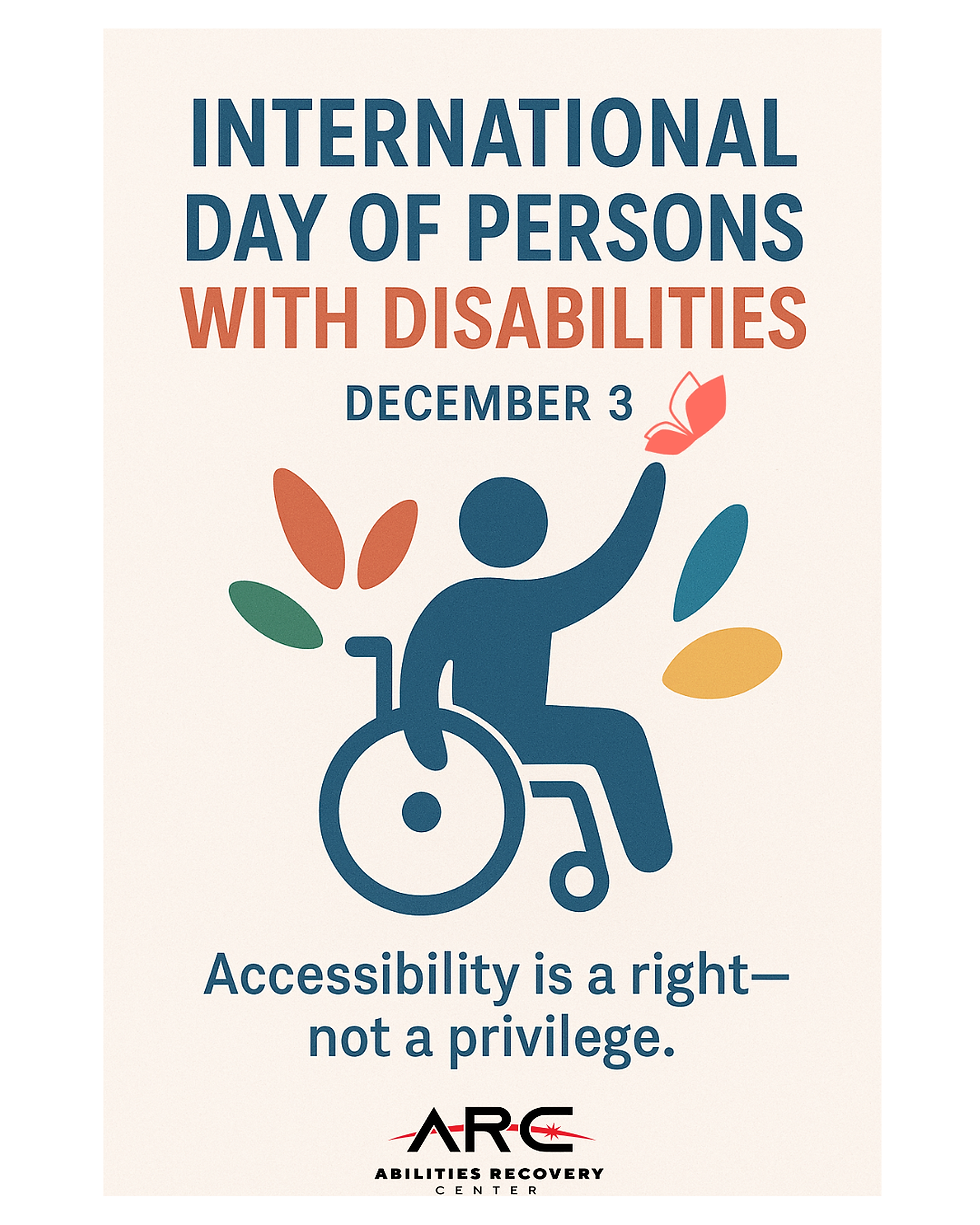Supporting Mental Health Through Recovery at Abilities Recovery Center
- Abilities Recovery Center

- May 6, 2025
- 4 min read
Updated: May 29, 2025

May is Mental Health Awareness Month, a time dedicated to recognizing the essential role that mental health plays in our overall well-being. At Abilities Recovery Center, we understand recovery is not just a physical journey; it also involves emotional healing.
Living with a neurological injury is a significant challenge. In addition to physical obstacles, individuals often face a range of mental health issues, including anxiety, depression, and post-traumatic stress disorder (PTSD). According to the National Alliance on Mental Illness, over 50% of individuals with neurological injuries experience depression or anxiety. The emotional toll can lead to feelings of isolation and fear about the future, making recovery feel even more intimidating.
By recognizing and addressing these mental health challenges, we create a supportive environment that promotes holistic healing.
The Impact of Neurological Injuries on Mental Health
Neurological injuries can change lives dramatically. Many survivors struggle with anxiety and depression, feeling overwhelmed by their new realities. A study by the Brain Injury Association found that nearly 45% of people with brain injuries report experiencing anxiety.
The fear of what lies ahead can also result in PTSD, lingering far beyond the initial incident. Feelings of isolation become common, especially as individuals adjust to new limitations. This emotional burden affects relationships, self-esteem, and daily functioning. It's crucial not just to focus on physical recovery but also to address these mental health aspects.
Movement Supports the Mind
At Abilities Recovery Center, we emphasize the importance of movement in both physical and mental healing. Exercise and structured therapy programs are key tools in tackling mental health challenges.
Regular physical activity has been proven to reduce anxiety and boost self-confidence. For example, a study published in the Journal of Clinical Psychiatry showed that just 30 minutes of exercise three times a week can lead to a 20-40% reduction in symptoms of depression. By incorporating movement into their daily lives, clients can rebuild their identity and sense of purpose.
Client testimonials highlight how engaging in physical activities leads to the release of endorphins, significantly enhancing mood and overall mental well-being.
Community Heals
At ARC, our gym serves as more than just a fitness facility, it is a thriving support system. We believe community plays a vital role in the recovery journey. Here, individuals are encouraged to share their stories, celebrate victories, and connect with others facing similar challenges.
Feeling heard and supported can be life-changing. This environment fosters empowerment, reminding everyone that they are not alone. Many have formed lasting friendships that provide encouragement and understanding.
By cultivating a nurturing atmosphere, we work to eliminate the stigma associated with mental health issues while promoting open discussions that strengthen the sense of community.
Mental Health is Part of Every Recovery Plan
To achieve true recovery, we must integrate mental health into every therapy plan. At Abilities Recovery Center, we focus on the whole person, the mind as well as the body.
This holistic strategy addresses the physical limitations from neurological injuries while also promoting emotional resilience. Our goal is to support clients in reclaiming their lives both physically and mentally.
You're Not Alone in Recovery
Recovery can often feel like a rollercoaster, filled with ups and downs. Navigating this journey can sometimes feel lonely. Yet, it's essential to remember: you are not alone.
At ARC, we emphasize the importance of seeking help and connecting with others. Support groups, peer interactions, and counseling form a reliable network to help individuals manage their emotional challenges more effectively.
This empowerment fosters resilience and hope. By sharing experiences, challenges, and successes with others, clients can develop a sense of camaraderie that alleviates the burden of recovery.
Final Thoughts
As we observe Mental Health Awareness Month, let’s reflect on the importance of emotional well-being in recovery. At Abilities Recovery Center, we are dedicated to supporting our clients through both physical and emotional healing.
Recovery is not a solitary journey, it is filled with connection, understanding, and community. As we confront the challenges associated with neurological injuries, we must remember that mental health is health. Mental health is not just a part of recovery; it is its foundation. Together, with compassion and determination, we can pave the way toward healthier, more fulfilling lives.
References Bryant, R. A., & Harvey, A. G. (1998). Relationship between acute stress disorder and posttraumatic stress disorder following mild traumatic brain injury. The American journal of psychiatry, 155(5), 625–629. https://doi.org/10.1176/ajp.155.5.625
Bertisch, Hilary C et al. “Anxiety as a primary predictor of functional impairment after acquired brain injury: a brief report.” Rehabilitation psychology vol. 58,4 (2013): 429-35. doi:10.1037/a0034554
Cooney, G. M., Dwan, K., Greig, C. A., Lawlor, D. A., Rimer, J., Waugh, F. R., McMurdo, M., & Mead, G. E. (2013). Exercise for depression. Cochrane Database of Systematic Reviews, 9(9). https://doi.org/10.1002/14651858.cd004366.pub6
Hart, T., Fann, J. R., Chervoneva, I., Juengst, S. B., Rosenthal, J. A., Krellman, J. W., Dreer, L. E., & Kroenke, K. (2016). Prevalence, Risk Factors, and Correlates of Anxiety at 1 Year After Moderate to Severe Traumatic Brain Injury. Archives of physical medicine and rehabilitation, 97(5), 701–707. https://doi.org/10.1016/j.apmr.2015.08.436




Comments